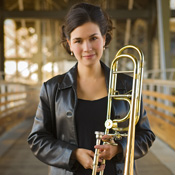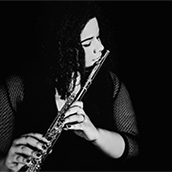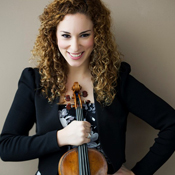
MSO Principal Tuba Robyn Black on Finding Her Musical Home
David Lewellen
PUBLISHED
Tagged Under: 2025.26 Season, MSO Musicians, Tuba
Since becoming the Milwaukee Symphony’s principal tuba as an undergraduate in college, Robyn Black has grown as a musician. Now, she has a chance to step in front of the orchestra as a soloist.
Black will perform Ralph Vaughan Williams’s tuba concerto this week, the first performance of the work by the MSO and her first experience with the piece as a professional.
While a student at Rice University in Houston, Black won the MSO’s audition in early 2020, just before the pandemic canceled orchestra performances for nearly a year. When a regular schedule resumed in the fall of 2021, Black took up her job and found “there’s so much you can’t prepare for.”
Over the last four years, “I had a lot of firsts, but it’s getting easier,” she said. “I’m getting used to learning new pieces. I can look at a part and know what’s easy or what I need to practice.”
Like all aspiring young musicians, Black idealized the world of full-time orchestras. “But it’s also like a job,” she said. “I went from sitting in theory class to being in the break room and listening to my colleagues talk about home improvements.”
Black uses two instruments for nearly everything. The larger tuba pitched in C is best for big orchestral repertoire, and a smaller one in F is for chamber music and earlier repertoire — and also for her solo turn. “It’s got so much more opportunity to be nimble and to move around on the instrument,” she said, “and the high range cuts through better.”
The tuba in its modern form was not invented until around 1850, and it took roughly another century for a major composer to write a concerto for the instrument — two facts that Black regrets. Historically, low-pitched instruments were regarded as less suitable for solo work because their sound did not cut through the orchestra. But, she said, “The tuba has really matured over the past 70 years. Perceptions are changing and people are coming around.”
Also, Black looks through repertoire written for other instruments with an eye for making transcriptions. Surprisingly, she says that a lot of music written for flute works well played two octaves down on a tuba, because both instruments require similar use of breath.
MSO management approached Black last season about doing a solo and suggested the Vaughan Williams. “It’s standard for a reason,” she said. “It’s a nice piece that I know really well already.” To an outsider, her list of “standard tuba concertos” sounds odd, but she says, “There are great works being written now. It’s exciting to see how the tuba has developed as a solo instrument over the years.”
But as she prepared for the upcoming performance, she tried to rethink her choices — for instance, in the slow second movement she will create longer phrases and use vibrato differently than she did as a student.
In four years with the MSO, Black has seen her playing mature. “It’s hard to notice day by day,” she said. “But I’ll listen to recordings from a few years ago and think that I would play that totally differently today.”
As a new fish in a big pond, Black was trying hard to blend and disappear into the orchestra’s sound. Now, she says, “I’ll play louder and let it shine through.”
She has enjoyed laying the foundation for the big brassy passages in the repertoire, but she has also developed an appreciation for the softer moments. “In a second movement, when you count 70 measures of rest and then come in for one whole note,” she said, “that can be special, when it scoops underneath and completely changes the color.” She mentioned the Shostakovich violin concerto as an example: “It’s terrifying to play because it’s so exposed, but it’s so satisfying when you get it right.”
Black grew up in the Chicago suburbs and is happy to be established close to family (her sister, Abby, was recently named principal horn for Lyric Opera of Chicago). She settled in Milwaukee’s Riverwest neighborhood when she arrived four years ago, and “it ended up feeling like home.” In both the city and the MSO, she said, “I feel at home here. My colleagues have made it very easy. Everyone’s been so welcoming and amazing.”



